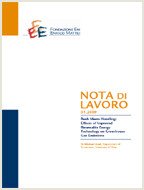Alliance Formation and Coercion in Networks

21.05.2011
Timo Hiller
D86, D74
Network Formation, Economics of Conflict, Contest Success Function, Structural Balance, International Relations
Climate Change and Sustainable Development
Carlo Carraro
This paper presents a game-theoretic model of network formation, which allows agents to enter bilateral alliances and to extract payoffs from enemies. Each pair of agents creates a surplus of one, which allies divide in equal parts. If agents are enemies, then the agent with more allies obtains a larger share of the surplus. I show that Nash equilibria are of two types. First, a state of utopia, where all agents are allies. Second, asymmetric equilibria, such that agents can be partitioned into sets of different size, where agents within the same set are allies and agents in different sets are enemies. These results stand in contrast to coalition formation games in the economics of conflict literature, where stable group structures are generally symmetric. The model provides a game-theoretic foundation for structural balance, a long- standing notion in social psychology, which has been fruitfully applied to the study of alliance formation in international relations.
